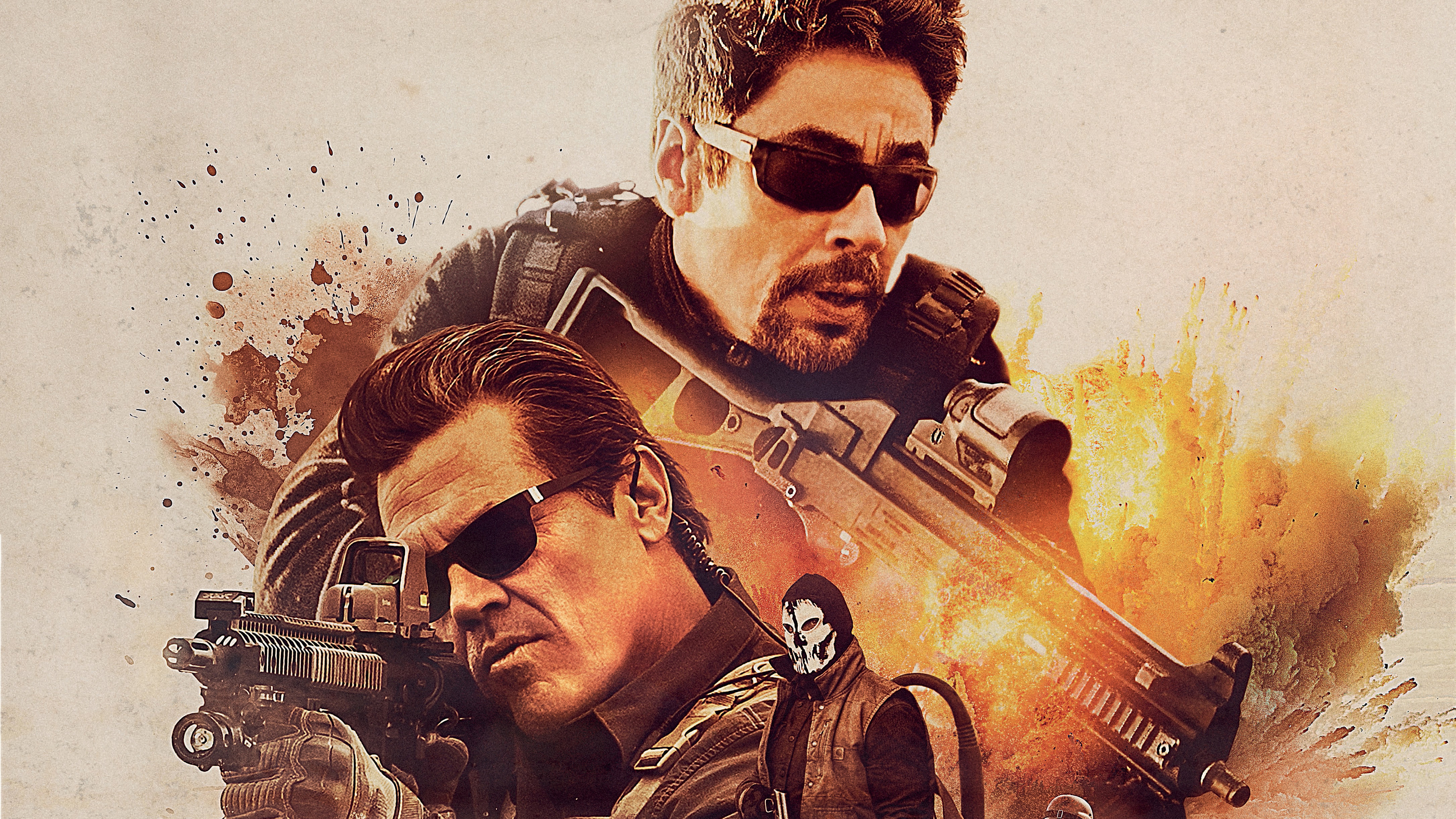By Sam Harris | @samewlharris
In 1971, French critics/scholars Jean-Luc Comolli & Jean Narboni (names surely familiar to the cinema studies crowd) proposed in their seminal ‘Cinema/Ideology/Criticism’ text that “every film is political, inasmuch as it is determined by the ideology which produces it.” Their theory suggests that a film’s reality depiction is nothing but an expression of the prevailing ideology; the camera doesn’t register reality as something concrete, it captures the unthought-out, unformulated world of its creation. For Sicario: Day of the Soldado, this world is America’s most heinous, borderline-propagandistic realm of imperialism, an unchecked war machine churning unnamed and unknown bodies at the hands of an impossibly efficient military task force.
As a writer much better than me has said, “to note the political repugnancy of [Soldado] is to stick a licked finger in the air and note the wind chill.” It’s a film that drapes the American flag both around its shoulders and over its eyes as it drowns the US-Mexico border in bullet casings and fatalities without a glance in the rear-view. Picking up somewhere after the events of the original Sicario, we find Matt Graver (this year’s top-billed villain, Josh Brolin) and Alejandro Gillick (Benecio Del Toro) reunited by a series of events that exist to put them back within arm’s length of each other. A division of the US government needs a war started with their closest neighbours and Brolin is tasked with getting his hands… dirty. Introduce the kidnapping of a cartel leader’s daughter (Isabela Moner, doing the most for underrated blockbuster cinema the past 12 months) and voila, everything goes to shit.
The glaring omission immediately evident in Soldado is its lack of Emily Blunt – an audience surrogate, alien to the trappings of all the amoral military intervention. Without someone there to keep us a relegated distance from the warfare, it’s just balls-to-the-wall action, a cocktail of sweat and blood spiked with testosterone. The moral questioning of its predecessor is lost in a cloud of smoke. Nobody stops and asks ‘why are we doing this?’ with any serious concern (as Catherine Keener’s antagonism barely registers). The gloves of morality are off and the blood’s on our hands this time around – not that we really asked to be bloodied. Sicario wasn’t exactly 2015’s Film Most Begging for the Franchise Treatment (may The Man From U.N.C.L.E. 2 find funding in heaven) but here we are, and the result – while spraying its truly questionable politics all over walls it doesn’t hold jurisdiction over – is better than it has any real right to be.
Director Stefano Sollima is less concerned with replicating the solemnity of Villeneuve/Deakins and filters Taylor Sheridan’s follow-up script through something more your conventional action fare. Credit where credit is due: DP Dariusz Wolski (known to us all for his work on the Pirates of the Caribbean films) holds it down on the battlefield. There’s a particularly inspired instant roughly halfway in, where the Mexican federal police ambush Brolin’s hit squad convoy and the film mounts another firefight. Missiles fly, cars explode like toys, and for a moment we remain suspended with the still kidnapped Isabela in the back of the Humvee. The camera lingers, moving from window to window like the digital eyes of a war correspondent caught at the wrong moment, then back to Isabela, hunched over, hands to her ears, distraught in a situation (and world) beyond her control. It’s about as close as we come to disorientation of the film’s predecessor. More than anything it speaks to the manipulation inherent in the CIA’s conniving, now barrelling through the border without question. Without Blunt as interpreter, the jingoism here goes untamed; without Blunt as intervener, we’re stripped of our agency, strapped in the backseat of a Humvee and forced to silently spectate the horrors.
On the other hand, there’s a carnal pleasure that’s stuck to Soldado like film on a windshield. The craft here is enthralling in the best of moments and at least interesting in the worst and leans more on Michael Bay’s 13 Hours than its predecessor – reductionist political exploitation fuelled by unwavering patriotism. It’s all men in helicopters with guns whipping up dust in service of something it doesn’t ever have the right words to articulate. It feels uncomfortable to sit complacent and watch this reckon with immigration. In the end there’s no real follow through. Soldado jumps ship at breakneck speed in its final 15 minutes, substituting its hard-worn nihilism to tiptoe into sequel set-up mode and culminates in the most eye-rolling bit of dialogue you’ll hear all year. But at times, the grey areas seem a little redder, and you can’t let the disgruntled charm of Brolin’s machoman confuse you – he’s not there for your sympathy.

